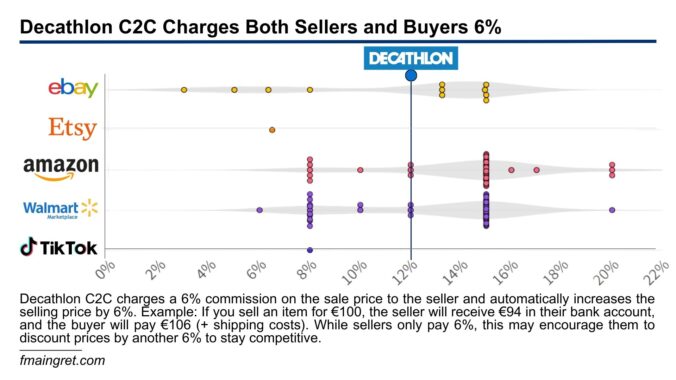I can’t help feeling angry when I see people throwing out perfectly fine products just to make room for new stuff. Not that I worry about them making easy money from reselling the items, but because of the waste of resources involved, especially when there are so many online resale platforms available. Many focus on fashion-related items, but we are starting to see more for other products. Only a few days after posting about Shein’s resale product, I read about the sport retailer Decathlon’s new resale platform for their products. And I thought, it is about much more than just pricing. Thinking about it, I can see many more reasons why companies are starting their C2C resale channels.
Decathlon Launches Their Resale Platform
In case you don’t know about the company, Decathlon is a French company and one of the largest sporting goods retailers in the world. It operates over 1,500 stores in more than 50 countries and offers a wide range of products for over 80 sports, including their own brands.
A few weeks ago, the company announced the launch of a resale platform, only in Belgium for now. Decathlon’s resale platform allows people to sell their used sports equipment directly to other customers. The process is pretty straightforward. First, the seller enters product details and uploads photos. The listing becomes visible within 72 hours. When a buyer purchases the item, the seller receives an email with shipping instructions and a label. The seller then has seven business days to clean, pack, and send the product. Once the buyer confirms the item’s condition, payment is transferred to the seller’s account within two business days. Decathlon takes a 6% commission on sales on both the seller and buyer side, which is around the industry standard on marketplaces.
Why are Retailers Coming up With Their Resale Platforms?
You’ve probably noticed that the recommerce market is growing. Older platforms like eBay or Craigslist are still around. We also see it on social media, for example, the popular Facebook Marketplace. Vinted is specialized in used clothing and is growing year after year. Now, we see retailers like Shein and Decathlon offering features to resell previously ordered items.
Of course, consumers are aware of the sustainability aspect of recommerce. This is especially true in the fashion industry, which is one of the industries impacting the environment the most. Why buy new products that consume more resources when perfectly fine pre-owned items can be reused? Not to mention the price difference between used and new items.
The idea of a more sustainable model is great news for businesses trying to improve their image, and I suspect that is the reason why Shein is offering resale features to their customers in France. But there is much more than the opportunity for promoting a company’s efforts to limit the impact of their products on the environment.
Adding the option to resell products allows brands to control a greater portion of the product life cycle. It’s not about the purchase only, but also the repairs, maintenance, and resale. Brands can now engage even more with their audience and extend the customer experience beyond just selling new products. This gives them more opportunities to collect data on their customers and market other products (for example, a customer selling his used bike might be in the market for a new one). Personalized shopping experiences are becoming a way for online retailers to increase their conversion rates and average order values, and these resale platforms could be a way to improve the efficiency of recommendations.
Finally, like other C2C platforms, Decathlon charges fees on each transaction (6% on the seller, but they also add 6% on the sale price, so I see it as around 12% fees if sellers must discount their product to remain competitive). This is another stream of revenue for the company and in line with what other platforms are charging.
Conclusion
Decathlon’s launch of a resale platform in Belgium is another great illustration of the expansion of recommerce. By facilitating the resale of previously purchased items, retailers not only address the environmental concerns associated with waste but also extend their control over the customer experience and the entire product lifecycle. This is also another source of revenue if the sales take off due to transaction fees. I wouldn’t be surprised to see more retailers launching similar services in the next few years.
https://www.decathlon.be/fr/c2c_lp-JCYPE6
https://www.marketmaze.me/article/decathlon-launches-resale-platform-in-belgium

